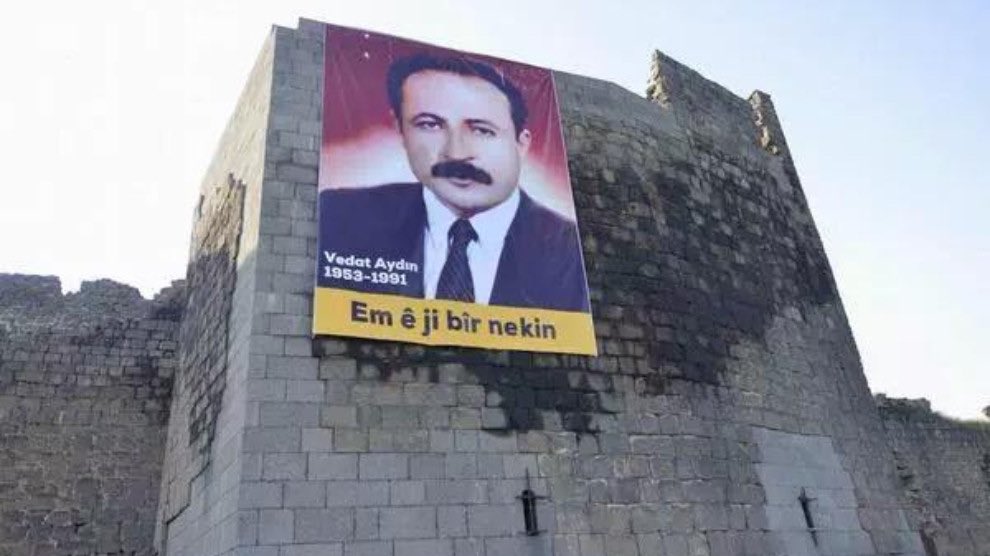Washington Kurdish Institute
July 6, 2020
By July 1991, Turkey’s most recent military coup, which was followed by the killing of thousands and the torture of hundreds of thousands more, was over a decade old. The Kurdistan Workers’ Party (PKK) was founded 12 years earlier in response to the Turkish state’s policy of denial and elimination of the Kurdish identity. The modern Republic of Turkey, established almost 7 decades earlier, represented the forcible creation of an exclusively Turkish state on the land that had been the home to many peoples, including the Kurds, for centuries, and violence and death were not new phenomena. Nonetheless, the assassination of Kurdish politician Vedat Aydin represented a new and more intense chapter in the Turkish state’s brutality against the Kurdish people of northern Kurdistan, the part of Kurdistan occupied by the Turkey.
Vedat Aydin was the head of the People’s Labor Party (HEP), a legal pro-Kurdish, progressive political party, in the city of Amed (Diyarbakir), the Kurdish capital. He was taken into custody by the Turkish police on July 5, 1991 – not an unusual event as Kurdish politicians were often detained and even tortured by state authorities. The dark events of the days that followed, however, were new and different, and would always be remembered by the people of northern Kurdistan. On July 7, a body with multiple gunshot wounds and bearing signs of torture was found in Maden, Elazığ, located about an hour drive from Amed, and it was soon identified as Aydin.
Days later, Vedat Aydin’s body was delivered to his family and a funeral was quickly organized in Amed. On July 10, over 100,000 Kurds defiantly assembled to bid farewell to Aydin. Their movement was blocked and they were met with live fire from police, and many fleeing the gunfire were captured and beaten. By the end of the massacre of mourners, 23 were dead and over 200 were wounded. No one ever faced justice for the murder of Aydin or those who attended his funeral.
The murder of Vedat Aydin and massacre of those mourning him represented a new and even more bloody stage in the Turkish state’s occupation of northern Kurdistan. As before, Kurdish identity was denied and eliminated. Now activists who sought to partake in the legal political process could be assassinated and Kurdish mourners were marked for death, and the killers, who would sometimes murder in the shadows and other times out in the open, acted with impunity. These murders were perpetrated by the state and prompted almost no condemnation from the international community.
The 1990s were a bloody decade for the Kurdish people living under Turkish occupation. Beginning with the torture and murder of Vedat Aydin, northern Kurdistan entered an era of extrajudicial killings by unknown perpetrators, and even today thousands of people are unaccounted for. The Kurdish people responded with large scale protests (described as “serhildan” or “uprising” in Kurdish), with women playing an active role in this popular mobilization. Since then, the Turkish state’s brutality against the Kurds has ebbed and flowed, and the Kurdish people have steadfastly demanded their rights and resisted the Turkish state’s occupation and uncompromising campaign of forced assimilation.
Decades after the murder of Vedat Aydin and those mourning him, Turkish President Recep Tayyip Erdogan and his Islamist Justice and Development Party (AKP) has expanded the Turkish state’s anti-Kurdish policies in two significant ways: (1) by invading Kurdish areas in Syria and Iraq and establishing zones of Turkish military occupation, and (2) by working hand in hand with various jihadist groups to massacre and subjugate Kurds in Syria. The massacres and displacement of the Kurdish people at the hands of Turkish state forces continues even beyond Turkey’s borders, and now the desecration of destruction of Kurdish cemeteries by the Turkish military and state forces is commonplace. While today, unlike in the 1990s, it is broadcast worldwide, as before, the international community remains silent.

